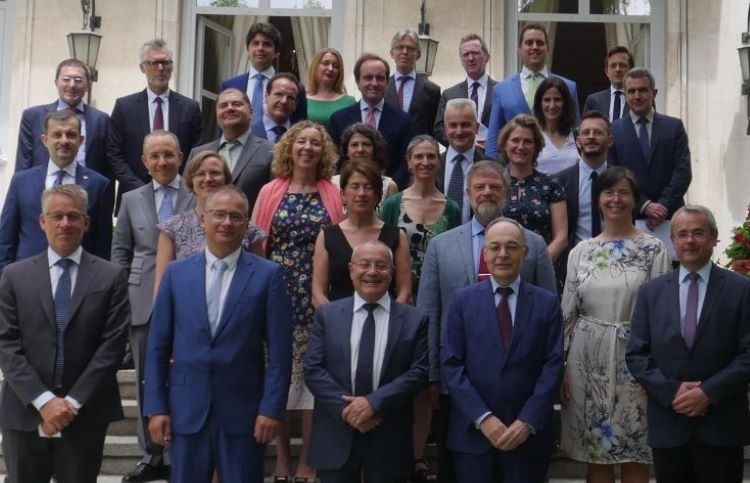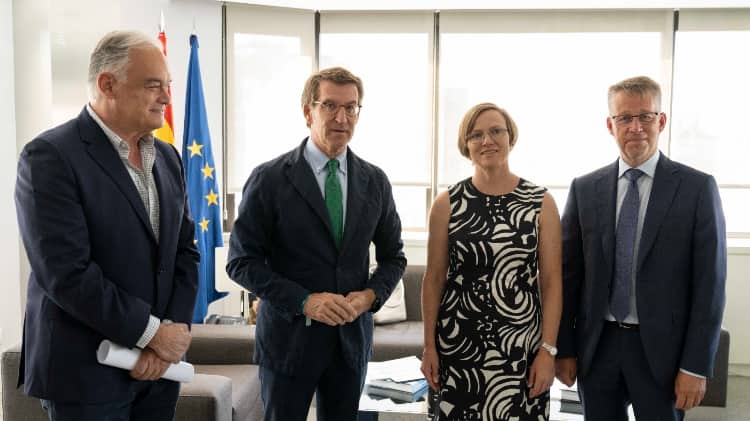The Diplomat
The French Ambassador in Madrid, Jean-Michel Casa, chaired this week a working meeting with the EU ambassadors accredited in Spain and the State Secretary for the European Union, Pascual Navarro, to take stock of the French Presidency of the Council of the EU, which ends next June 30.
According to the Embassy, the meeting took place at the French Residence in Madrid on June 14 and “provided an opportunity to take stock of the progress made in the last six months, before handing over to the Czech Republic on July 1”. The meeting concluded, precisely, with a symbolic handover of the European Presidency to the ambassador of the Czech Republic, Ivan Jančárek, who will officially start his local activities on July 6 with the traditional act of flag-raising.
In a context dominated by “the return of the tragic in Europe” and by Russian aggression against Ukraine, this semester has marked “a real epochal change for the European project,” according to the ambassador, who, like the Secretary of State, welcomed the “great unity” shown by Europeans and the “firmness” of their response to Russia and their support for Ukraine. “We can be proud to be Europeans and what we are capable of achieving when we are united,” Casa declared.
Despite the fact that this crisis has “profoundly” upset the order of priorities that France had set for the six-month period, the ambassador was proud that “the legislative calendar has run its course” and made it possible to achieve such important results as the adoption of the strategic compass, the agreement last March for the creation of a mechanism for adjusting carbon emissions at borders and the launching of the instrument of reciprocity in access to public markets.
All these texts consolidate “a Europe of sovereignty, less naive vis-à-vis its competitors”, declared the ambassador, who recalled other agreements approved in these six months, such as the directive on minimum wages, the regulations to regulate the activities of technological giants in Europe and protection for network users, and the directive on pay transparency to guarantee equality between women and men in the world of work. Pascual Navarro and Jean-Michel Casa also welcomed the significant progress made in the area of external border controls.
Jean-Michel Casa also recalled other challenges ahead of the last days of the French Presidency, and a few days before the NATO summit in Madrid, such as the achievement of a stronger European defense and the reduction of energy dependencies, which would entail a diversification of supplies, an accelerated effort in the field of renewable energies and a reindustrialization supported by massive investments. “These are decisions both of sovereignty, to no longer depend on our partners, and of climate responsibility, to build our path towards carbon neutrality,” said the ambassador. For Pascual Navarro, this challenge also raises the revision of the stability and growth pact, so that strategic investments are not counted as public debt.
A few months before the preparation of the Spanish Presidency of the Council of the European Union, in the second half of 2023, the State Secretary outlined some of the priorities that Spain will raise, such as the integration of the Atlantic and Mediterranean area, the follow-up of the conclusions of the conference on the future of Europe, the preparation of the accession of the candidates to the EU, the consolidation of social Europe and the development of the ecological transition.
This meeting was the last in a series of dialogues organized by the French Embassy with members of the Spanish Government to address Spain’s European priorities. Specifically, the EU ambassadors were able to talk with the Minister of Foreign Affairs, José Manuel Albares; the First Vice-President and Minister of Economic Affairs and Digital Transformation, Nadia Calviño; the Third Vice-President and Minister for Ecological Transition and the Demographic Challenge, Teresa Ribera; the Minister of the Interior, Fernando Grande-Marlaska; the Minister of Defense, Margarita Robles; and the Minister of Inclusion, Social Security and Migration, José Luis Escrivá.







